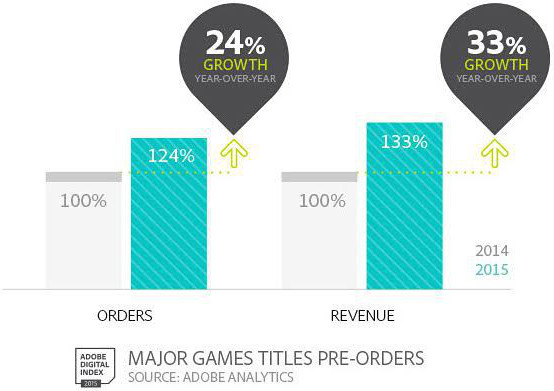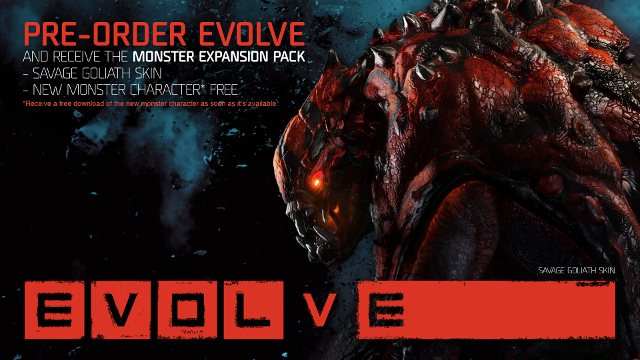Pre-orders have been a major point of controversy in the gaming industry for the past couple years. As publishers have found new ways to use them as a weapon to secure more pre-release sales, gamers have become increasingly cautious. However, the caution hasn't been enough to thwart the growth and impact of pre-order bonuses, and it's hurting gaming as we know it.
Pre-Orders Are On The Rise
Adobe Analytics has published data for how many video game pre-orders have been sold through to consumers so far in 2015, and the results are surprising. Compared to the year before, pre-orders are up a significant 24% year-over-year resulting in a 33% growth in revenue. This comes before the arrival of Star Wars: Battlefront and Fallout 4, two games that eclipse anything holiday 2014 had to offer, so the figures are likely to increase from here in the following two months.

The Warnings Were On The Wall
During the past year there's been a growing uprising against pre-orders within the gaming community. Posts can be found on gaming forums and social media across the web that share why gamers should wait until after games release before buying them. This has extended to the press where there have been dozens of pieces urging gamers to stop pre-ordering.
Below are some examples:
- Boogie2988: Please Stop Pre-Ordering Your Games
- CraveOnline: Here's Why You Shouldn't Pre-Order Games in 2015
- GameSpot Forums: Why You Should Not Pre-Order Your Games
- HardcoreGamer: Why You Shouldn't Pre-Order Games in 2015
- Kotaku: Stop Pre-Ordering Video Games
- IGN Forums: Stop Pre-Ordering Games!
- Polygon: You Shouldn't Pre-Order Alien: Isolation (or any other game)
The message wasn't ignored, either. Each of the above works accumulated widespread discussion. In the case of Boogie2988's video, just under 700,000 people watched the video. Kotaku saw big traffic with over 210,000 views and more than 100 comments. You'd think that it would have had an impact, but it doesn't appear to have.
Publishers Love Pre-Order Bonuses
Publishers hate risk. If they can get consumers to lock-in to a purchase before a game hits store shelves, investors feel much more at-ease. Nothing is more disconcerting than investing tens of millions of dollars on a product and having no real idea how much it'll bring in. For many AAA games it's never an issue as they sell enough copies to easily surpass the break-even point, but for others post-release becomes a life-long struggle to recuperate investment.
In addition to this, games are becoming increasingly complicated. Budgets are higher than ever, and so is risk. As a result, game quality has become more volatile than ever before as developers have their complex products rushed to market. In many cases, release becomes a big compromise with polish, features, or presentational values being pushed to the wayside to meet a deadline. With this, there is a surplus of expensive-to-develop games that are considered by many to be underwhelming (i.e. Assassin's Creed Unity, The Order: 1886, and Watch Dogs).

The job of the publishers of these games isn't just to try and sell the game, but to bring in profit. So, instead of sitting around and watching their games burn from post-release controversy and poor reception, they're offering pre-order incentives that get consumers to put money down before they find out that the game didn't meet expectations.
Lastly, there's the statistical fact that games sell a significant portion of their lifetime sales during the first month following release. In most cases, not even a big price drop in the distant future has as much impact as the popularity of a fresh release. It's natural for publishers to try and take advantage of the opportunity by pushing consumers to buy a game sooner rather than later. Pre-orders are just one proven effective way to accomplish that.
It Needs To Be Said Again
The big problem, and why gamers have made a big stink out of all this, is that consumers are being increasingly punished for not pre-ordering a game. Take for example Evolve, which would grant a free monster expansion pack with pre-order, as well as a Savage Goliath Skin. Players could tell at launch that these two pieces of content were stripped from the original package in order to entice pre-orders.
Similarly, NBA 2K16 granted pre-orders a code to receive 10,000 MT Coins, which provide a significant boost in MyPLAYER effectiveness on the court. Earning these coins through normal means required hours of work. Those who didn't pre-order were at a disadvantage right out of the gate.
No matter how alluring it might be, cutting down pre-orders is the only way to get this trend to stop. It's too lucrative, and it's becoming a greater problem with time. Publishers aren't going to get the message unless many gamers participate. Unfortunately, given the ineffectiveness of the discussion over the past year, it might be too late to do anything about it.







